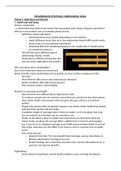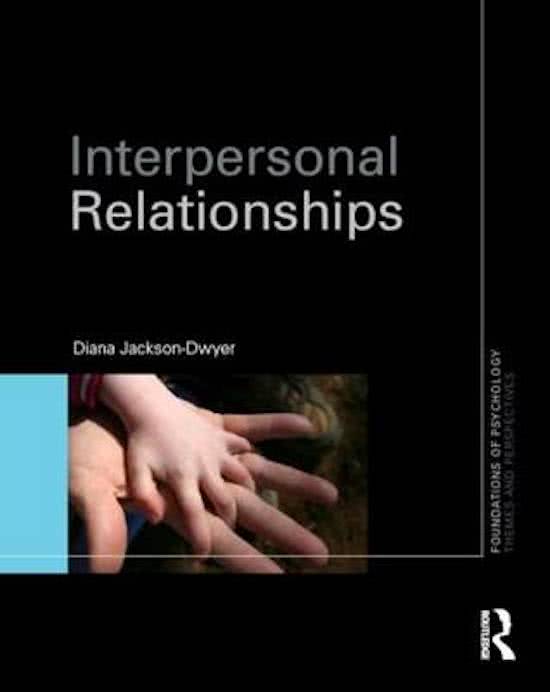Development of primary relationships notes
Theme 1: definitions and theories
1. health and well-being
Primary relationship
= a relationship that exists to the extent that two people exert strong, frequent, and diverse
effects on one another over an extended period of time
- Definitions always talk about:
o Interdependence (two people depending on one another)
o Need fulfillment (what they do in the relationship should fulfill certain needs,
these needs can very between individuals)
o Emotional effects (if something happens in the relationship it should involve
an emotional response)
- We will look at the different type of
relationships (family, friends,
romances) in a lifetime perspective, but
also how they might affect one another
Why care about these relationships?
Due to the important impact for mental and
physical health. Social relationships of less quality can have certain consequences like:
- Die early
- More illnesses (like cancer and cardiovascular diseases)
- Health conditions (like high blood pressure)
- Poor immune system, lower healing
Research on marriage and health
- Have become more difficult due to high divorce rates
- For instance, people who are married, never divorced, and did not lose their partner,
show better health, than people who have gone through a divorce or lost their
partner
- People who remarry after losing their partner, have shown better health than people
who lose their partner and stay single
- In addition, length of marriage doesn’t seem to matter, so it’s not about how long
you are married, but whether you are married or not
- Finally, it also doesn’t seem to matter how many times you have been divorced
- These results are about the average effect, unlikely that it’s true for all marriages,
e.g., if you are in an unhappy marriage, your health may have been better if you had
stay single, outcomes can also differ if you have to care for a partner due to health
issues
- Past versus present
o Research from the ‘70s: men benefit from marriage, women more likely to.
Become depressed if marriage turns sour
o Recent findings: men externalize (alcohol) more, women internalize more, in
general: marriage has benefits
Explanations
- Social selection hypothesis: mental health problems cause marriage breakdown
, - Social causation hypothesis: marriage breakdown causes mental health problems
- Both hypotheses are likely to be true; but not for widowhood when they lose their
partner and didn’t have mental health problems beforehand, they also show health
problems so this can only be explained by social causation hypothesis
Question: but what about new relationships and health?
Research in an academic summer school. Show people who were more central in the
network (more relationships) are:
- Happier, have less stress, causing higher mental health
- But also, more illnesses, more risk behavior, causing lower physical health
- Conclusion: primary relationships are important for health, but when searching for
social status and acceptance (when wanting to form new relationships) it can lead to
more risk behavior. So, forming new relationships might be a good thing for your
mental health, but not for your physical health
2. determinants of relationships
Proximity
- Physical distance, the actual distance in meters, e.g., children sitting close to each
other in classroom are more likely to become friends
- Functional distance, the likelihood that you will interact, e.g., due to common friends,
which makes it more likely that you will come in contact with each other
- True for youth and elderly
- True for friendships and romantic love
- Also true for quality of relationships
- Also true for enemies
- Is the importance of proximity diminishing? (Due to e.g., social media)
o No, not for forming relationships (social media is more used for pursuing
existing relationships)
Similarity
- ‘Birds of a feather flock together’
- Friends/partners similar in:
o Demographics
o Attitudes and values
o Personality
o Popularity
o Physical attraction: matching hypothesis
o Antisocial behavior and depression
Complementarity
- Opposites attract?
- Little support
o Only in case of dominance/submission
- Similarity triumphs over complementarity
Attractiveness
- Physical attraction
o Beauty facilitates social life
o Halo effect: ‘what is beautiful is good’
, o Attractive children/adults are judged and treated more positively than
unattractive counterparts
Reciprocal liking
- We like people who express a liking for us (reciprocity effect)
- Self-fulfilling prophecy -> transforming belief (they like me) into actual reality
- Complex effect: the people we like most are those who we initially disliked
Competence
- We prefer people who are socially skilled, intelligent, and competent
- ‘What is beautiful is good’
- -> ‘What is good is perceived as beautiful’
- Not only important for forming a relationship but also for remaining a relationship,
we like people more when we learn they are competent
Summary
- Proximity seems to be most important determent
- Besides that also the determents similarity, physical attraction, reciprocal liking and
competence seem to be important factors
- Complementarity doesn’t have a lot of scientific prove
3. theories of attraction
Theories
- Reinforcement theory:
o People behave in ways that are rewarding and desist from behavior with
adverse consequences
Social exchange theory
Interdependence theory
Equity theory
- Evolutionary theory
o Behavior evolved to maximize the likelihood that individuals can pass on their
genes to next generations
Social exchange theory
- Economic model
- Maximize rewards and minimize costs
- The most satisfying and long-lasting relationships are those that involve the greatest
rewards/lowest costs
- In line with current research findings about e.g., proximity
- Limitations:
o Humans are not rational
o We not only weigh the present, but also past and future rewards and costs
o ‘Honeymoon period’, in the beginning costs do not impact the relationship
that much, more focused on the rewards
o Alternative relationships not taken into account
o -> interdependence theory
Interdependence theory
- Two cost-benefit analyses






